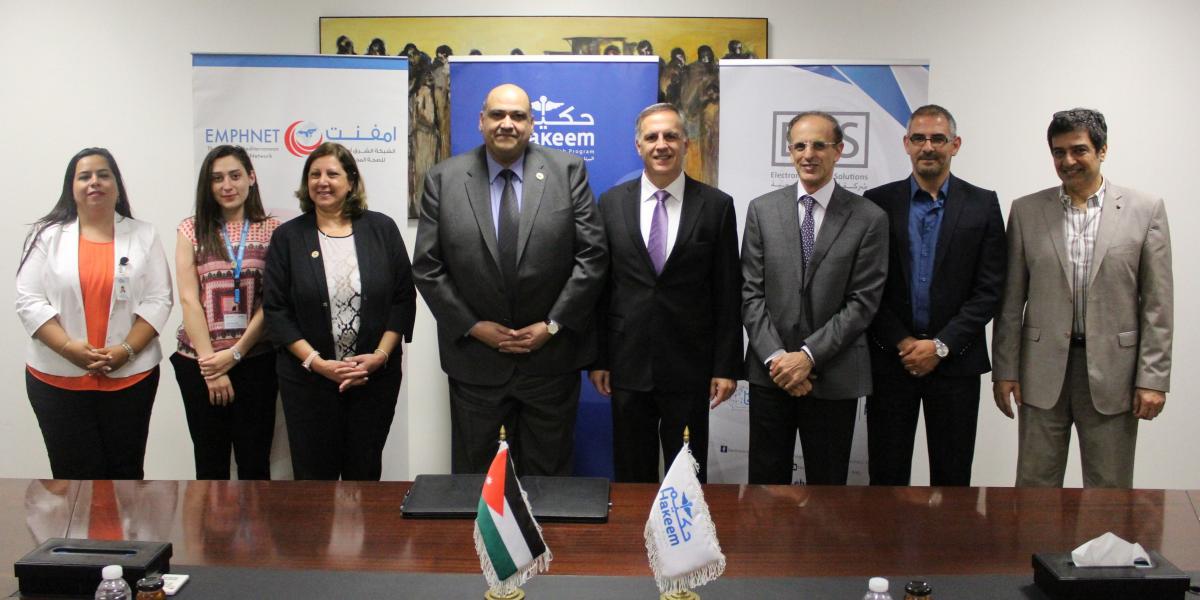Electronic Health Solutions and the Eastern Mediterranean Public Health Network develop reproductive health registry system in Mafraq

Amman, 19 August 2019
Electronic Health Solutions (EHS) has signed a cooperation agreement with the Eastern Mediterranean Public Health Network (EMPHNET) to build a reproductive health registry system for women during pregnancy and childbirth, providing sufficient information to enhance the medical service provided.
The agreement was recently signed in the presence of EHS Chairman Dr Rami Farraj, EHS CEO Eng. Feras Kamal, and Middle East Community Health Network CEO Dr Muhannad Al Nsour.
Under the terms of the agreement, the two sides will cooperate on the development of an integrated and harmonized reproductive health records system that ensures the provision of adequate information on personal care for women during pregnancy and childbirth. This step is hoped to augment women's health services by providing the required data quickly and efficiently.
The system will be implemented in Mafraq governorate through the Ministry of Health’s medical centres, in addition to the Mafraq Gynecology/Pediatric Hospital in the governorate and the King Talal military hospital.
Commenting on the signing of the agreement, EHS Chairman of the Board Dr. Rami Farraj said that the agreement comes within the company's plans to qualitatively expand the coverage of the different stages of providing medical services, whereby reproductive health and services for women during pregnancy and beyond are considered to be of great importance to maternal and child health and disease prevention. It is therefore crucial for medical interventions to be based on accurate data, thus facilitating the use of best medical practices.
Eng. Feras Kamal, EHS CEO, pointed out that this system emanates from the company's endeavours to integrate the services it provides. It offers health service providers with the necessary accuracy and speed through an appropriate database and gives the recipients of the service enough data to be able to choose the most suitable service.
Dr. Muhannad Al-Nsour, Executive Director of the Eastern Mediterranean Public Health Network stressed the importance of cooperation with EHS due to its long experience in the sector, in addition to its technical and human capabilities. In turn this has enabled it to provide high-quality products and services as well as building database systems with flexibility and high efficiency that have won wide satisfaction from the service provider and recipients, as well as contributed to the development of an efficient Jordanian health sector.
He further pointed out that the agreement comes as part of the efforts of the Eastern Mediterranean Public Health Network (EMPHNET) to partner with health institutions in Jordan and a group of other countries working in the region, such as Saudi Arabia, Yemen, Pakistan, Afghanistan, Iraq and Egypt, whereby reproductive health is given special attention due to its impact to reduce communicable and noncommunicable diseases in addition to monitoring disease developments.
The Eastern Mediterranean Public Health Network is a not-for-profit limited liability company in accordance with the legislation in force in the Kingdom. It operates at the local and regional levels to strengthen public health systems to improve results and focuses on supporting training to strengthen the capacities of public health cadres and build sufficient knowledge to prevent disease outbreaks and observe them.
EHS, a none for-profit company, was founded in early 2009 to support and strengthen the healthcare sector in Jordan. The company relies on technology to provide effective technical solutions to enhance the quality and efficiency of public health care services in Jordan in order to further contribute to a more dynamic future for the health sector in the Kingdom. Its partners include the Ministry of Health, the Ministry of Digital Economy and Entrepreneurship, The Royal Medical Services, the Royal Society for Health Awareness, the Private Hospitals Association, King Hussein Cancer Center and the King Abdullah II Development Fund.